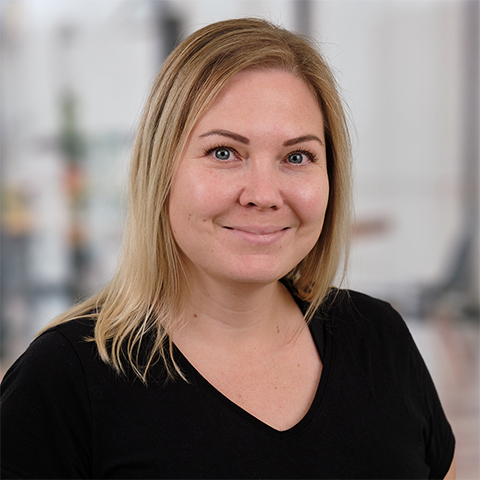'Simple things can go wrong … and cause disease'
In her first year as a graduate student at the University of Helsinki, Jenny Hogstrom attended a conference in Boston organized by the American Association for Cancer Research. She already liked the basic science behind cancer research and the fact that it could make a difference for many people. The meeting increased her interest.

“Cancer biology is interesting because simple things can go wrong in your body and cause disease,” she said. “I heard amazing talks and attended mentoring sessions organized by women in cancer research, and it was inspiring hearing postdocs and their journeys.”
Hogstrom earned her Ph.D. in medicine and oncology. Her graduate research focused on gene regulation in intestinal stem cells and colorectal cancer.
She then looked back to the Boston area to continue her research. But after spending most of her life in Finland, moving to the U.S. for a postdoctoral fellowship at Harvard Medical School was difficult.
“Learning how things work here was the biggest headache,” she said. “The bureaucracy was hard to get used to.”
However, she advises trainees who are hesitant about making such a move to go for it. “If there is some lab and science and it is in another country or place, be brave and move — you meet new people and grow as a person.”
Hogstrom is now working toward completing her postdoctoral studies. Her first project involves how changes in the metabolism of breast cancer cells affect drug resistance to targeted therapies. She is also studying how cancer-associated fibroblasts stimulate resistance to CDK4 inhibitors in breast cancer cells.
Hogstrom faced a stumbling block when she tried to grow patient-derived organoids that maintained estrogen receptor–positive expression. She used biopsied bone tissue, which is rarely studied and even less often used for research models. She sought help from experts, she said, and juggled her projects to keep them all moving forward, trying to focus on each while keeping in mind the bigger picture.
“Some days when nothing is working, it is hard,” she said, “Whether it is positive data or negative data, at least it is data, and it tells you something, and this motivates me.”
Hogstrom’s persistence was rewarded with a 2024 JBC/Herbert Tabor Early Career Investigator Award for the paper about this work.
She hopes to study drug resistance in other cancers and develop more patient-derived organoid cultures from different tissues.
Outside the lab, Hogstrom likes to travel and spend time with her dog Paddy.
Using organoids to study drug resistance in HR+ breast cancer
In recurrent hormone receptor–positive, or HR+, breast cancer, tumor cells have either estrogen or progesterone receptors or both, and the downstream signaling promotes tumor growth. Few good models, either animals or cell lines, exist for studying this cancer.
Jenny Hogstrom and her lab found a clinically relevant way to study HR+ breast cancer by culturing HR+ breast cancer patient-derived organoids, or HR+ PDOs, and matching cancer-associated fibroblasts, or CAFs, from primary and metastatic breast cancer.
Hogstrom and her colleagues cultured HR+ PDOs that maintained estrogen receptor expression long enough to determine if they responded to therapy. Also, they compared the original patient’s drug responses and PDOs’ responses to targeted therapies such as ER targeting and CDK4/6 inhibitors. Sometimes, the team saw drug sensitivity in PDOs but resistance in the patients’ drug responses. This could be due to the tumor’s extrinsic factors, such as the stromal environment, influencing responses.
CAFs in breast cancer have many subtypes; some promote tumor cell proliferation and drug resistance, while the function of others is unknown. The researchers found an increase in the expression of cytokine-responsive pathways in PDOs with CAF-conditioned media and saw many cytokines causing resistance to the chemotherapy drug fulvestrant.
The research Jenny Hogstrom and her colleagues published in JBC allows researchers to use high take-rate HR+ PDOs to test for drug resistance. Patients do not need to participate in multiple clinical trials to identify drug targets to advance basic and translational research.
Enjoy reading ASBMB Today?
Become a member to receive the print edition four times a year and the digital edition monthly.
Learn moreGet the latest from ASBMB Today
Enter your email address, and we’ll send you a weekly email with recent articles, interviews and more.
Latest in People
People highlights or most popular articles

2026 ASBMB election results
Meet the new Council members and Nominating Committee member.

Simcox wins SACNAS mentorship award
She was recognized for her sustained excellence in mentorship and was honored at SACNAS’ 2025 National Conference.

From humble beginnings to unlocking lysosomal secrets
Monther Abu–Remaileh will receive the ASBMB’s 2026 Walter A. Shaw Young Investigator Award in Lipid Research at the ASBMB Annual Meeting, March 7-10 in Washington, D.C.

Chemistry meets biology to thwart parasites
Margaret Phillips will receive the Alice and C. C. Wang Award in Molecular Parasitology at the ASBMB Annual Meeting, March 7-10 in Washington, D.C.

ASBMB announces 2026 JBC/Tabor awardees
The seven awardees are first authors of outstanding papers published in 2025 in the Journal of Biological Chemistry.

Decoding how bacteria flip host’s molecular switches
Kim Orth will receive the Earl and Thressa Stadtman Distinguished Scientists Award at the ASBMB Annual Meeting, March 7–10, just outside of Washington, D.C.

